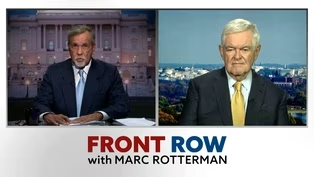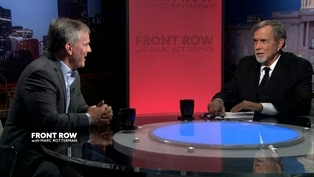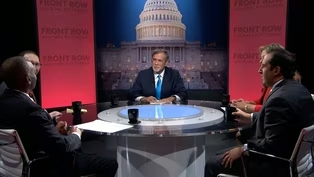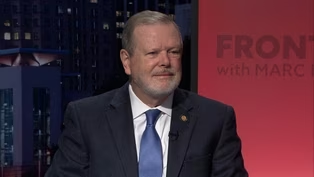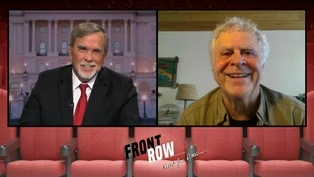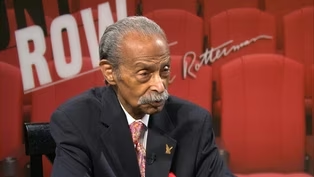
A Conversation with Speaker Tim Moore & Sen. Dan Blue (2021)
Season 11 Episode 13 | 26m 46sVideo has Closed Captions
A conversation with NC Speaker of the House Tim Moore and Sen. Dan Blue.
Host Marc Rotterman has a conversation with NC Speaker of the House Tim Moore and Senator Dan Blue the Democratic Leader in the NC Senate. They discuss the state budget, criminal justice reform and many other issues.
Problems playing video? | Closed Captioning Feedback
Problems playing video? | Closed Captioning Feedback
Front Row with Marc Rotterman is a local public television program presented by PBS NC

A Conversation with Speaker Tim Moore & Sen. Dan Blue (2021)
Season 11 Episode 13 | 26m 46sVideo has Closed Captions
Host Marc Rotterman has a conversation with NC Speaker of the House Tim Moore and Senator Dan Blue the Democratic Leader in the NC Senate. They discuss the state budget, criminal justice reform and many other issues.
Problems playing video? | Closed Captioning Feedback
How to Watch Front Row with Marc Rotterman
Front Row with Marc Rotterman is available to stream on pbs.org and the free PBS App, available on iPhone, Apple TV, Android TV, Android smartphones, Amazon Fire TV, Amazon Fire Tablet, Roku, Samsung Smart TV, and Vizio.
Providing Support for PBS.org
Learn Moreabout PBS online sponsorshipMore from This Collection
Explore this collection of special interviews from FRONT ROW with Marc Rotterman.
August 26, 2022 - FRONT ROW with Marc Rotterman
Video has Closed Captions
A conversation with former Speaker of the House Newt Gingrich (26m 46s)
A Conversation with NC Attorney General Josh Stein (2021)
Video has Closed Captions
A conversation with NC's Attorney General Josh Stein. (26m 46s)
Video has Closed Captions
A long awaited reunion, Samaritan's Purse fills children's boxes & Habitat for Humanity. (26m 46s)
A Conversation with Senator Phil Berger (2021)
Senate Leader Phil Berger discusses NC's budget, redistricting, and the Leandro case. (26m 46s)
A Conversation with Homer Hickam (2020)
Video has Closed Captions
Host Marc Rotterman has a conversation with Homer Hickam. (26m 46s)
A Conversation with Henry "Mickey" Michaux (2019)
Video has Closed Captions
Henry "Mickey" Michaux joins host Marc Rotterman for an exclusive interview. (26m 46s)
Providing Support for PBS.org
Learn Moreabout PBS online sponsorship- Hi, I'm Marc Rotterman.
Coming up, a conversation with North Carolina's Speaker of the House, Tim Moore and Dan Blue, the Democratic Leader in the Senate.
Next.
♪ A complete list of funders can be found at: ♪ - Welcome back.
Joining us now, North Carolina, Speaker of the House, Tim Moore and State Senator Dan Blue.
Good to see you gentlemen.
- [Tim Moore] Good to be with you Marc.
- Good to see you today.
- Let's begin with the state budget.
Mr. Speaker.
You have the floor.
- Well thank you.
Well this has been a, a, long, but a very positive process in terms of our state budget.
The, Senator Berger and I came to an agreement just a few days ago, on a few remaining items, and those have now been sent to the Governor.
Hopefully he'll sign that budget.
He may want a few changes, but we're going to have that conversation.
Our goal is to, to try to get a bipartisan budget that every member will be able to vote for.
That, that does so much.
But a lot of great highlights from that budget, record amount of funding for public education in this state.
We put money into economic development, the most money ever spent, at any time, in capital construction.
For those folks who hate sitting in traffic, you'll love this budget.
More money into transportation.
Buildings from K-12, community colleges, to our universities.
Trying to use a lot of that one-time money that we received from the federal government as well, not to create long-term recurring entitlement programs, but to go in and actually put that into capital projects we know are needed Expanding broadband, improving education, it's a solid win.
And one other thing, the largest tax cuts we've seen in this state in decades.
- Senator, what was left on the table from you perspective?
- Well we need to look at the details of the budget.
See what the real expenditures are, or investments in education.
We know that we're facing the challenge of Leandro decision.
We got a judge that said that we are not meeting our constitutional obligation.
So a lot of our perspective will depend on how well that obligation is being met with early child investment, with the investments and our teachers, and investments in the low wealth counties in the state as outlined in the Leandro decision.
A lot of rural counties, 51 of our counties lost population in the last census.
And so they can't carry the burden.
And we got to make sure that we're delivering the essentials for a basic education in North Carolina, throughout the state.
- I want to talk about Leandro on a deeper dive when we get into education, but let's talk about where you did agree, and that's criminal justice reform.
- We have, I think it was significant move by both chambers, not only the bicameral agreement that we reached, but the bi-partisan effort in the Senate.
We had members intimately involved in formulating the things and House Bill 300.
There were provisions in it more clearly defining what riotous activity is.
Provisions in it regarding expungement of records after awhile, so that people get a certain - How does that work?
- Basically they would get, after a certain set number of years, they could petition and, and generally get their convictions expunged so that they wouldn't be prohibited from entering the job force.
- Who, who qualifies for that?
- It, it's a multitude of people.
More importantly are the people who didn't qualify for it.
- Okay, yeah that's good.
- Yeah, things like DWI wouldn't automatically qualify, but, driving while under the influence, but you could see how they matched up with other offenses and get those other offenses off.
So you wouldn't have somebody permanently marked.
People other than, you know, class A, or B, C. - Felonies.
- Felons yeah, could qualify for it and get a new chance in life, after a certain period.
Now we started on this and, and, and, and provisions started in the house by Leo Daughtry some, some years ago on this whole expungement effort, and this simply expanded it, so that more people are eligible for it and giving people a real second chance.
That was the name of the bill.
That's what drew our attention to it.
And I commend all of those who, who stayed on the battle line to get it done.
- It, those kinds of when you have a problem with the law, it does follow you for the rest of your life.
Doesn't it?
- Well it does.
One thing that we saw was that North Carolina, in terms of, of, of criminal records, one person could be a college student and have like an underage alcohol violation.
And they may think nothing of it go pay that ticket and not worry about it.
Well, then a couple years later, they're in the job market, they're applying for a job.
And then all of a, may be the difference between them getting that job and not getting that job and so we, but other states would, would, would expunge or, or remove those kinds of things from records.
So we realized that we were putting North Carolinians who had committed some minor, you know, sort of, sort of petty crime, - In the backseat.
- You know, just, yeah that we were putting them behind.
So we wanted to fix that.
But at the same time, we wanted to make sure that those folks who committed violent crimes, crimes of moral turpitude, serious offenses, where there was danger involved, that they would not be getting expunged.
- What was the problem with the Riot Law, the governor did veto that, right?
- He, he did.
And I, and I had hoped that, that bill would be signed into law, that, that bill passed by 80 something votes.
When it, when it left the house, it had strong bipartisan support.
It went into the Senate, and unfortunately it became, became a very, a partisan charge type thing.
I, I'm disappointed that it did, but we saw firsthand the destruction here.
I mean, Senator Blue, I think his office may have even been vandalized downtown.
The destruction that happened.
And what we tried to do with that mark was to carefully balance the rights of those who want to protest, under the first amendment to protect that we should always do it, but protect that.
But, you know, it's not protesting.
It's not the exercise of free speech to take a skateboard and smash in a window, to try to burn down a building, to assault someone.
And so we increased the penalties, for those kinds of offenses.
I'm disappointed it was vetoed.
I am hopeful that we will be in a position to come back and look at an override, but, you know, perhaps maybe some conversations can happen as well to see if there's some consensus language, because we must never, ever, ever, excuse violence and destruction of property.
- Sir, can we get to consensus on that?
Can you get a consensus on that bill?
- Well, we thought that the provision and the Senate bill that we sent over to the house was much better.
It clarified the law regarding riots, but it respected the first amendment right, to protest and to demonstrate.
And there was such broad coverage of that bill that you could simply be participating in a protest and somebody that you have absolutely no control over, goes and does something stupid.
I don't know any rational, reasonable person who will try to justify destructive behavior during a protest.
And we know that that happened back a year ago when we had the protest relating to the George Floyd, the incident.
But the Senate bill took, I think, a more realistic approach to it.
And that was the reason that you had the divide.
When the house bill came over that more narrowly defined, I think, the ability to exercise your first amendment rights you ought to be able to protest.
You ought to be able to go and tell public elected officials or anybody else, what you feel about what they're doing.
The first amendment protects it.
But you ought to feel some, some sense secure that when you do it, and you're not violating the law, you're not part of some conspiracy with that fellow who throws a rock, that throws the brick through the building.
- So you don't lump all everybody into one wagon.
- Yeah, it was far too broad and, and the way that it included everybody.
And again, I'm going to encourage the speaker to go back and look at the Senate provisions.
It passed the Senate unanimously, I believe.
As we redefine and reshape the law of, of riot and protest.
- Mr. Speaker, we have, go ahead.
- I, I just wanna respond to that.
We did actually take that Senate language with respect to mere presence, to make, we made it very clear that simply being present when this happened would not elevate someone to that heightened penalty, but it would require the actual affirmative willful act, which is a much higher standard, to do it.
So we actually fixed that in the bill.
- Is that a judgment call by an officer, a willful act?
- Well it's obvious anything's going to be a judgment call of an officer.
If the officer says, you're speeding, you thought it was 55.
He says it 60, there's that it's always, there's always going to be a judgment call.
- Okay.
We do, talking about officers, we do have a problem with retention with our, our officers in the prison system.
Talk to us about that.
You tried to help on that.
- That has been a challenge.
We've actually seen losses of life due to those shortages.
We've seen corrections officials who were understaffed, who, who lost their life to violence.
We have made it clear by the investments in this budget that we, we've increased salaries.
We've added other additional safety protocols.
There's new technologies that are being funded to make those jobs safer, because we have to have folks to, to guard those inmates.
And I have yet to ever have the, in my private practice, have a client who was happy about being in prison or being in jail.
So the folks who were there are, generally don't want to be there, but we have to have prisons.
We have to have jails for an orderly society, particularly for those who are violent.
And we have to do all we can to support those men and women who go in every day to make sure that those, the folks who were incarcerated are, are safe themselves, but that we in society, outside are safe.
- Senator, do you want to weigh in here?
- Oh yeah.
I agree with the Speaker.
It was absolutely crucial that we substantially increase our investments in the preparation of law enforcement officials, prison of corrections officials, and the budget contains substantial increases in pay for those officials.
We also have to recognize that some of these same pressures are on the local jails, not just state institutions.
And I think that, you know, that gives us other areas to look at, but this budget does a significant job in trying to show some appreciation for the corrections officials, you know, not just in the pay that they're going to receive, but in other conditions and benefits that they'll be entitled to.
- Yeah.
I want to talk about this problem.
I've talked to A.G. Stein about this several times while he's on the show, we've got a huge fentanyl and opioid crisis in this state.
Are we making progress?
- I believe we're making progress.
You know, a lot of the issues that we're dealing with on that basically rise to the federal level.
Supply and all of those kinds of issues.
You know, the attorney general has been involved in lawsuits against the companies who manufactured these opioids.
We're trying to have mental health programs, to better deal with it.
It's a broad array of issues that we need to be concerned about.
I think we're making progress.
I think we're much more aware of what needs to be done now than say, we were five years ago.
- You know, Tim, I saw an article the other day where it said there's enough fentanyl in this country, kill every man, woman, and child.
And then I read another statement by Barack Obama who said open borders are unsustainable.
Do we have open borders?
Is it a national security crisis, you think?
- We have absolute malpractice by our current president, when it comes to keeping our border secure and protecting Americans.
What we're seeing in terms of the fentanyl and other dangerous drugs and dangerous individuals for that matter coming across this border is just, is, is beyond the pale.
We've seen the numbers of folks who are, you know, over, who were incarcerated or being held in these detention facilities, just overwhelming the system.
And, and, but fentanyl and the drug trade.
You talk to anyone, they'll tell you, most of these drugs are coming in through this border that has practically been thrown wide open.
And so we're doing all we can in this state.
I agree with Senator Blue, the state has put record amounts of resources into battling these drugs.
But you know, what, if, if our president would do something to stabilize and protect our borders and stem the flow there, it would help a lot.
- Well, were Trump's, let's take Trump's personality out of this.
Okay.
But were, his policies remained in Mexico, building the wall.
Was that working?
- No, it was not working.
The number of people coming across the border has not significantly changed.
I know that there was basically an increase recently.
- It was 200,000 a month.
That's quite a lot.
- But, but you look at the pressures that are causing that.
I think it's unfair to say that it's Biden policies.
These are policies that have been in place, probably at least two decades.
The, the, it, it's the failure of the American system to deal with it.
We have to deal with immigration, in a meaningful way and immigration policy.
I think that you can keep people in Mexico before they cross over, but that, - That was the remain in Mexico policy which was for asylum.
- That does not substantially impact on the amount of illegal drugs coming across the border.
It impacts on the number of people coming across, but not substantially on illegal drugs.
- Jump in here.
- Since president Biden was, was elected.
We've had over 200,000 people per month entering the, the border illegally, the border patrol agents hands have been tied behind their backs.
They've not been provided the resources they needed.
You had a wall that was actually working everyone.
It was deterring.
It was limiting folks coming across the border and this president stopped it.
And now, and, and so you wonder, why do we have an increase in crime?
Why do we have more drugs?
- No evidence that the people coming across the border, this additional 200,000, are people who are drug runners.
The drug runners have figured out how to maneuver around, - They've actually confiscated, They've actually been confiscating more drugs once they have gotten into the country, by the way.
And they've caught people who have been on like the terrorist watch list.
Who've been coming through this way.
And that's what they've caught.
Imagine what hasn't been caught, I mean, when we know that's our main pipeline for drugs to be coming into this country, we the, there should be, we should be able to put partisanship aside.
And usually the president, President Biden should say, you know what?
He was wrong.
He's going to go back to enforcing a border.
I mean, there's a reason we have borders.
- Yeah, I agree totally.
You have to enforce the rules of people coming into the country.
- And the first thing of that, is keeping people out of the country.
- The wall is no what keeps people from coming in.
- Gentleman, to be continued of camera.
Okay.
I want to talk about public education.
The big ticket items, teacher pay is that negotiable with the governor.
What is it?
A 4% over two years.
- Right now we do have, we, we did make a teacher pay increases and other state employee pay increases.
The exact amounts right now are still being negotiated with the governor.
So I'm going to leave it at that because in the context of our negotiations, through the conference process, we, we, aren't going to be talking about specific numbers, but what I will tell you is this.
Both in the Senate budget and in the house budget, you saw a great investment in, in our teachers, our state employees and in public education for that matter.
There, there's more money being put into public education in this budget than in any time in our state's history.
So it, and, and we were able to do that through a lot of the cost savings we've had through some of the federal funds and really just through trying to target those funds to make sure those dollars are being spent, not on bureaucracy, but on getting the best education possible to our students.
- Senator, and, and what we have to do, Marc is have a commitment to making the investments in pre-K the early childhood programs.
So the kids are ready when they start school to continue learning, not just first or second grade, but throughout their lives.
I think that we can make more substantial investments.
There are investments in this budget to do that.
I have not seen the final provisions that the speaker and president pro tem negotiated on it, but, but that's a key point, but I'll also say that the, one of the most important things, beyond the parents in a student's experience in school are the teachers.
So you have to invest in the teachers.
And when we talk about the kind of pay raises that they deserve, they went through this pandemic, they did the impossible in trying to educate our kids during the pandemic.
They have not had a pay raise in four years, four years.
And the last time a budget was adopted, there ought to be a substantial pay raise for public school teachers in this budget.
And the numbers that I'm seeing do not meet the definition of a substantial pay raise.
In addition to that, we've had retirees to come out and work and help get us through this pandemic.
They have had not, that is retirees state level, including teachers have had, not had, have not had a pay increase since 2009, no cost of living increase.
Imagine how much the cost of living has gone up in the last 12 years.
And they still sit on the sideline.
So there needs to be provisions in this budget that ensures that retirees get a decent cost of living increase and going forward, that they can rely on that.
- I want to talk about another aspect of education and, and I want to talk to both of you about this, because it's flared up around the country.
Do you, do parents have the right to know what their children are being taught in school?
Should that be online?
Should they be able to see that?
Should it be transparent?
- The answer is, 100%, yes.
Parents have a right to know what's being taught to, to their students.
And we ought to, and our schools ought to be teaching the things students need to know.
We don't, we don't need to be having political, you know, politicization of, of, of, and agendas put forward through this curriculum.
We know we compete in a global economy and we need the students going through our schools in North Carolina to be able to compete, not just with other kids in the next school district or in other states, but internationally.
And we need to focus on those, those areas that are needed.
We know this, any child who cannot read by the third grade is going to have a very difficult time succeeding thereafter.
One thing that that Senator Blue and I agree on, for example, is expanding pre-K. That is something that is being done in this budget as well.
- You're expanding broadband, too, right Senator?
- I was going to say that.
- Absolutely.
- This year or last year, when so many children were home, trying to learn, we saw the, the inequities there with a lack of access to broadband.
So, amazing amount of investment in broadband, in this budget as well.
- Thoughts on that?
On the transparency issue.
- Yeah.
I, I agree with Speaker.
Parents absolutely have a right to know what their kids are learning, but also we have to respect that the teachers and the principal come through a structure when they know when things are age appropriate, parents have a right to know what that is and have discussions with the teacher.
What happens in a classroom depends on that classroom teacher and the leadership in the school, the principal.
And I think that they ought to be intimately connected with the parents so that they know, but the teachers are the professionals.
And there ought to be constant conversations between teachers and parents and other interested folk, on what these kids are learning.
We as politicians ought not try to get involved, in how they teach it.
When you determine that kids are age appropriate, for certain kinds of lessons.
- Let's talk quickly about the Leandro case.
Do judges have the right to tell the legislature how to appropriate money?
- I earn a living convincing judges that I'm right, about what I say.
I think the constitution give the judiciary, the separate authority to determine what the constitution requires.
And if they say that the constitution requires performance at a certain level as legislators, we have the ultimate authority on how we spend the dollars and what we appropriate for.
But we ought to do that with the knowledge that we may be and probably are violating the constitution.
If we're not doing it adequately.
- Thoughts quickly, we only got about five minutes left.
I got some bullet points I want to hit.
- The general assembly has the constitutional duty and prerogative when it comes to taxing and spending, that should be left to the duly elected representatives of the people, not, not to judges.
And what I will say this, on Leandro, I do think that case has shown, through its process, has pointed out, frankly, what probably Senator Blue, who grew up in a rural county.
What I know in a rural county exists out there.
You have some areas of this state that face a lot of challenges.
They tend to be inner city and rural areas.
And that what I can tell you is that in this budget that we've passed, that has, by the way, over 300 million more dollars in the first year alone for public education.
Invest a record amount in those communities that, that are struggling the most.
- Let's talk about voter ID.
There's a move by the NAACP who's suing.
They want two judges removed on a court case, on a voter ID in North Carolina Supreme court.
Speak to that, sir.
- Well, it's not just voter ID mark.
I think it speaks to a broader issue.
And as lawyers, we have a certain system of ethics, and even judges have their system of ethics.
And if you have a direct interest, you think that you're being influenced by these interests.
You are to recuse yourself from a case.
And the instances now before the court is whether one who passed, voted to pass the law that is before the court, should step down.
Clearly that person has a conflict of interest because they're going to preserve what they did unless something changed their mind over the last three or four years.
Secondly, one of the judges is a son of a defendant named in the lawsuit.
And you don't sit as a judge in any other circumstance to judge what a family member did.
A judge always removes himself or herself from determining whether what their family member did is right or wrong, guilty or not guilty.
And so clearly those judges ought to recuse themselves.
- Jump in here quickly.
Then I want to talk about redistricting.
- So what the court is looking at doing right now is you have a democratic majority on the Supreme Court that is essentially trying to silence two duly elected Republicans of the Supreme Court.
When it comes to critical issues, the, the analogies with all due respect to Senator Blue, simply do not apply in this case.
When either I or Senator Berger is sued, were not sued as individuals.
We're sued as the presiding members of the legislative body, it is a formality.
It is not a, its not a conflict, it's never been interpreted as a conflict.
And the thought that a number of justices of the Supreme Court would, would force two other justices to recuse.
In my opinion is malfeasance.
- They're sued because, because they have an interest in the outcome of the litigation, that statute was changed eight or ten years ago, allowing the legislative leaders to sue, it's the job of the courts to interpret what we have done, not for us to be in the court, trying to justify what we've done.
They are parties to the litigation.
They have a direct interest in this outcome.
- Gentleman, gentleman we have a short time, I want to get into redistricting real quickly.
- I do need to respond that.
It's not a personal interest.
It's an interest that we have as the elect, as the leaders of a, of a body elected by the people it's really for the people.
And when you mentioned voter ID, remember this, the people of this state went into the polls and voted - 55% - 55, 56% support, but yet the same justices say that it's unconstitutional.
I just, it just, it shocks the conscience.
- Okay, let's talk about redistricting.
Do we need, some are advocating, Senator for independent commission?
Do we need an independent commission to redraw these lines?
- Ultimately, I think that you need, you, you need something other than us as legislators.
And I've said that for some time, because I've been in charge of drawing lines.
And I know the different urges that human beings have when their direct future politically is involved in it.
You need some neutral force.
Now we can't do it this round because the constitution requires that the legislature do it.
So we need to revisit that.
But, but I think that the process that we started two years ago, it was now a much more transparent, open process so that the people know what you're doing and you're not playing shenanigans.
- I've got a hard out.
Quickly, 20 seconds rebuttal, and I gotta go.
- Very simply, we have a great process in place.
I think transparency is great.
We've adopted criteria about how the counties get grouped together.
And so having those parameters is very helpful, but you know, we've, we've drawn districts in compliance with the laws as we understand them, and we're going to continue to do that.
And that's what we're going to do this year.
- I want to thank you both.
This has been a great conversation, that's it for us.
Thanks for watching.
Hope to see you next week on Front Row, have a great weekend.
♪ A complete list of funders can be found at: ♪

- News and Public Affairs

Top journalists deliver compelling original analysis of the hour's headlines.

- News and Public Affairs

FRONTLINE is investigative journalism that questions, explains and changes our world.
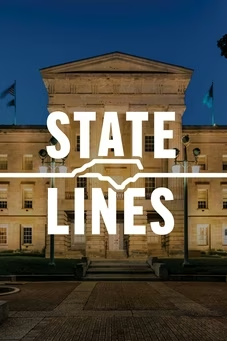











Support for PBS provided by:
Front Row with Marc Rotterman is a local public television program presented by PBS NC
